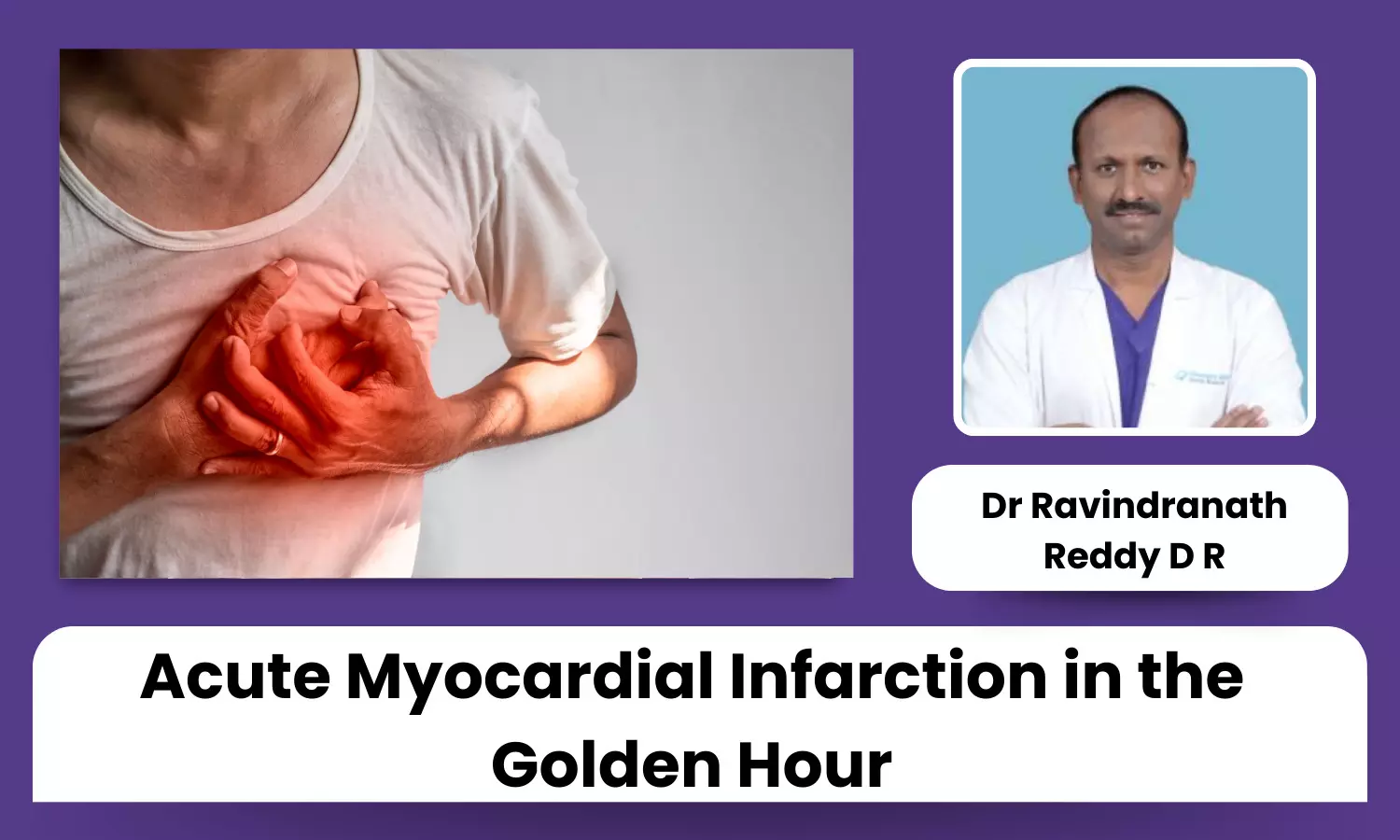Rapid Response: Diagnosing and Treating Acute Myocardial Infarction in the Golden Hour - Dr Ravindranath Reddy D R

Acute myocardial infarction (AMI), commonly known as a heart attack, remains a leading cause of mortality worldwide. Timely diagnosis and intervention within the first hour, known as the "golden hour," can significantly improve survival rates and outcomes. This critical period demands swift action to restore blood flow to the heart muscle, minimizing damage and preserving cardiac function.
Recognizing Acute Myocardial Infarction
Recognizing the symptoms of AMI is the first step in ensuring prompt treatment. Patients often present with:
- Chest Pain: The hallmark symptom, often described as a squeezing, pressure-like, or burning sensation in the centre or left side of the chest. This pain may radiate to the shoulders, arms, neck, jaw, or back.
- Shortness of Breath: Difficulty breathing or a feeling of suffocation.
- Nausea and Vomiting: Gastrointestinal distress can accompany AMI.
- Sweating: Profuse sweating, often described as cold sweats.
- Fatigue and Weakness: Unusual and severe fatigue can be a symptom, particularly in women.
Immediate Diagnostic Measures
Upon presentation, rapid assessment is crucial. The following diagnostic steps should be undertaken:
- Electrocardiogram (ECG): An immediate ECG is essential to identify ST-segment elevation, indicating an ST-elevation myocardial infarction (STEMI). Non-ST-elevation myocardial infarction (NSTEMI) can also be diagnosed through ECG changes, although less pronounced.
- Cardiac Biomarkers: Blood tests for troponin levels provide confirmation of myocardial injury. Elevated levels are indicative of AMI.
- Physical Examination: Vital signs, heart sounds, and lung examination can offer additional clues and rule out other potential causes of chest pain.
Reperfusion Strategies
Reperfusion therapy aims to restore blood flow through the blocked coronary artery. The two primary methods are:
- Primary Percutaneous Coronary Intervention (PCI): PCI, also known as angioplasty, is the preferred reperfusion strategy for STEMI patients. It involves mechanically opening the blocked artery using a balloon and stent placement. Ideally, PCI should be performed within 90 minutes of first medical contact.
- Thrombolytic Therapy: In settings where PCI is not immediately available, thrombolytic therapy can be administered to dissolve the clot. Agents such as alteplase, reteplase, or tenecteplase are used, ideally within 30 minutes of hospital arrival.
Comprehensive Management
Post-reperfusion care is essential for optimal recovery and includes:
- Antiplatelet Therapy: Medications such as clopidogrel, ticagrelor, or prasugrel are used in conjunction with aspirin to prevent further clot formation.
- Beta-Blockers: These reduce myocardial oxygen demand and prevent arrhythmias.
- ACE Inhibitors or ARBs: These medications help to reduce cardiac workload and prevent remodelling of the heart post-infarction.
- Statins: High-dose statin therapy is initiated to lower cholesterol levels and stabilize plaque.
Patient Education and Lifestyle Modification
Preventing future episodes of AMI involves educating patients on lifestyle modifications and adherence to medication regimens. Key recommendations include:
- Smoking Cessation: Smoking is a major risk factor for AMI, and quitting significantly reduces risk.
- Diet and Exercise: A heart-healthy diet low in saturated fats and regular physical activity help maintain cardiovascular health.
- Regular Monitoring: Regular follow-ups with healthcare providers to monitor heart health and medication effectiveness.
Conclusion
The golden hour presents a critical window of opportunity to save lives and reduce the burden of acute myocardial infarction. Prompt recognition, rapid diagnostic measures, and immediate intervention are paramount. As healthcare providers, our commitment to these principles ensures that we offer the best chance of survival and recovery for our patients.
By adhering to these guidelines and remaining vigilant, we can make significant strides in improving outcomes for those experiencing acute myocardial infarction. The heart of the matter is time, and in the golden hour, every second counts.


